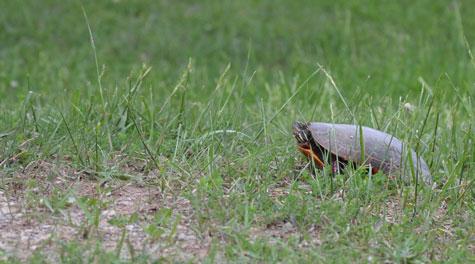Turtle nesting season

Turtle nesting season has begun in area
Local specialists urge people to watch for turtles crossing roads, help them to safety when it is safe to do so; Community’s help can support long-term survival of turtles, local authorities say; Freshwater turtles cross roads at this time of year as they search for places to nest
Many freshwater turtles die each spring when they cross the road and are hit by cars. Local people can help to protect these species. “You can help when you watch for turtles as they cross the road,” said Hope Brock, Healthy Watersheds Technician with Ausable Bayfield Conservation. “You may also help them across the road, when it is safe to do so.”
Each year, from late May to early July, many of Ontario’s freshwater turtles leave the safety of their wetlands, creeks or rivers. They do this as they make a trek in search of sites that are fit to nest. No area of land in southern Ontario is more than 1.5 kilometres from a road. That means turtles are likely to cross a road when they need to make this nesting journey. Road mortality is one of the biggest threats facing turtles. Another reason is the loss of the habitat turtles need in order to live.
There are eight native turtle species in Ontario. Seven of those species are at risk.
The local ecological system depends on having diverse animals that each play a role to keep that system healthy. The turtle is a vital part of that eco-system, Brock said. “Turtles help to control aquatic vegetation,” she said. “Turtles serve as scavengers. This means they help clean our creeks and wetlands by eating dead and decaying fish and other organisms.”
It takes a long time for most turtles to reach maturity. Mature turtles may live a long time but turtles reproduce at a low rate. Any time a mother turtle dies, or any adult turtle dies, there is an impact on the future of the species. A Snapping Turtle would have to lay about 1,400 eggs in her lifetime, on average, in order for just one of her offspring to survive to adulthood. “Saving even one adult by safely moving it across the road can help to conserve that species,” said Brock.
Ausable Bayfield Conservation and the Port Franks area community started a turtle monitoring program in 2010. “There is a great community in Port Franks that is genuinely concerned about the turtles that live there,” said Brock. More and more people from a wider area are becoming aware of turtles and the threats they face, according to Brock. They want to help to protect these animals that can live a long time. She said this desire to help is shown by the increase in the number of calls Ausable Bayfield Conservation receives from residents throughout the watershed.
How do you correctly help a turtle cross the road? Never pick up a turtle by their tail as this can damage their spine. Always move them in the direction they are headed.
Smaller turtles can be picked up on the sides of their shell and moved across.
(Snapping Turtles require a little more care. They should only be handled near the back of the shell. Snapping Turtles have very long necks and may be able to reach back and snap at you).
Once one has a firm grip on the back of a turtle’s top shell near their tail, depending on the size of the turtle, one can lift or gently drag the turtle to safety. You may also use blankets, towels, shovels and car mats to transport the turtle across the road.
A video about safe turtle transport, posted by Toronto Zoo Adopt-a-Pond, is online at: youtube.com/watch?v=Lgd_B6iKPxU
What if you find an injured turtle? If you find an injured turtle, carefully place it in a box or plastic container with a secure lid. You may then transport the turtle to a wildlife rehabilitation centre. Ausable Bayfield Conservation can direct you to the nearest centre. One may also contact Salthaven Wildlife Rehabilitation Centre (519-264-2440) or Heaven’s Wildlife Rehabilitation Centre (519-466-6636) directly. Volunteer couriers may be available to drive the turtle to the centre. Note that even if the turtle cannot be saved, wildlife rehabilitation staff may be able to save the eggs inside the turtle.
If you would like to find out more about turtles and how you can help monitor turtle populations and protect these species, contact Hope Brock at Ausable Bayfield Conservation. Phone 519-235-2610 or toll-free 1-888-286-2610 or e-mail Hope Brock through our staff contacts page.